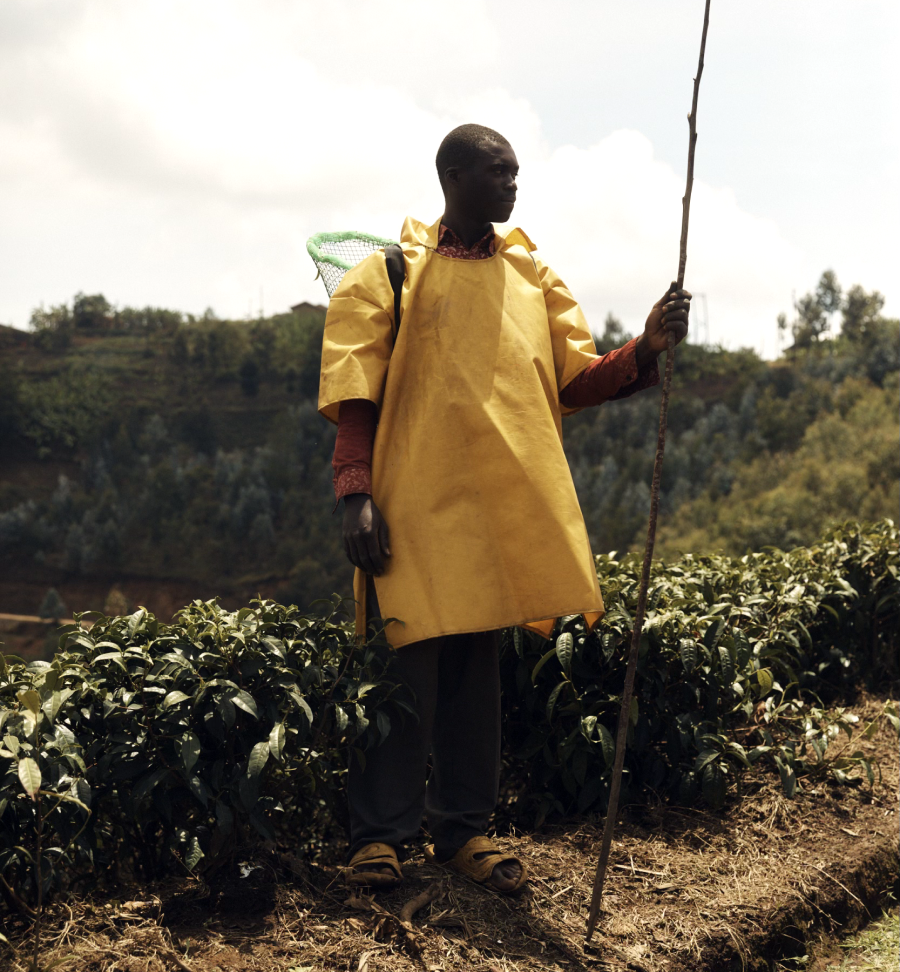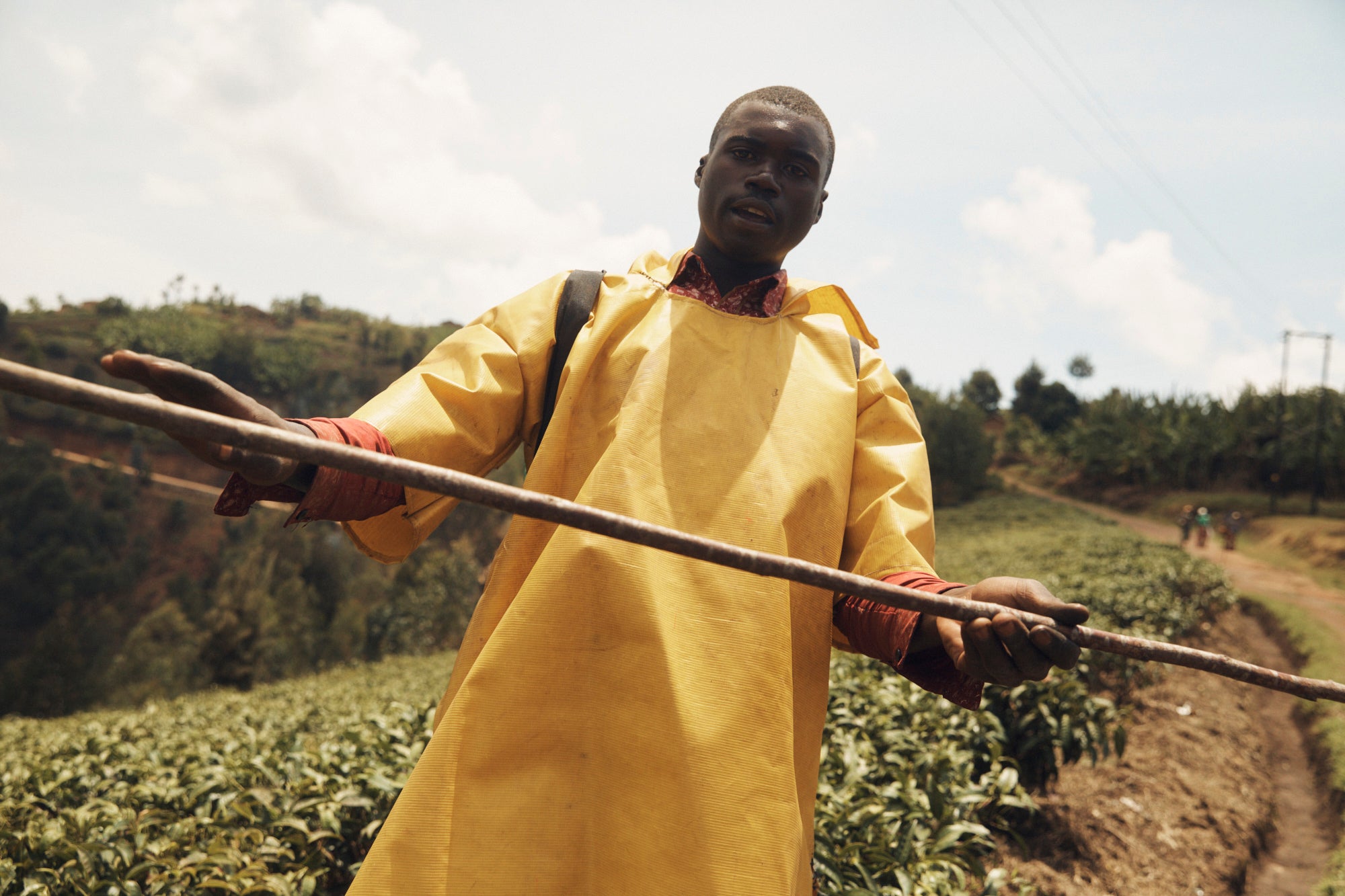SPILL FARMER MODEL
Call us bold but we think these principles will start to change the tea industry. It’s the model we’ll follow as we continue to buy tea. There's a summary here if you like your stories short or you can get stuck into the detail below.




Denise plucking tea. Tea leaves sorted by quality standard.
better tasting tea
Quality
In the last 50 years, the tea market has encouraged selling huge amounts of tea, cheaply. And the quality has gone down with the price.
Tea used to cost more than gold and taste special. Now, it costs 2p a teabag. You can't get a penny sweet for that these days.
So it's no wonder that our tea tastes "meh" and we're drinking less of it.
And no wonder the farmers who grow it receive too little.
So, quality is important; for our taste buds and for tea growers.
We only buy great quality tea; it involves craft and good practice and deserves a good price.
Tea farmers in Rwanda work to a formal plucking standard for the best quality tea. They receive a bonus for plucking tea to that standard. And they pluck by hand; hands see better than machines.




Innocent on his family farm, Rugabano, Sept 23
a better farmer price
Smallholder farmers take their “green leaf” tea to the factory.
The factory processes it into the finished tea that companies buy – and you drink.
So when tea companies buy tea, they pay the factory, and the factory pays the farmer.
Paying a higher price for quality tea is one step.
Making sure the farmer receives a fair share of that price is the next.
Tea is grown in different countries, in different qualities, and sold through different buying systems.
So there isn’t one single “fair price.”
But two things really matter:
1. The market price for tea
2. The cash in the farmer’s pocket
1. The market price
Each year, countries publish the average price paid for made tea through auction.
Average Market Price, Rwanda 2024: $2.84/kg
SPILL pays $4.03/kg (2024/25) for higher-quality tea.
And because prices rise and fall, we’ve set a SPILL Minimum Price of $3/kg for 2025/26 – so farmers don’t lose out if the market drops.
For context:
Fairtrade publish a Minimum Price for their certified partners – a certified floor price within their audited model.
Fairtrade Minimum Price, Rwanda 2025: $2/kg
Fairtrade’s price is part of a certified, audited model. Ours is a direct agreement.
The figures are here to give context, not as a like-for-like comparison.
2. Cash in the farmer’s pocket
Because tea is bought from the factory, the farmer who grows most of the tea is often out of sight.
And in most tea chains, no one asks _ or shares _ what the smallholder is actually paid.
We do.
We always ask.
And we always share.
In Rwanda, the farmer share is set by law at 50% of the made-tea price for quality tea.
It is transparent and well-regulated.
But even with that structure, we know the income smallholder farmers receive from their tea isn’t enough.
So we pay an additional $0.50/kg directly to the farmers who grow our tea – lifting their income by around 25%.
why cash matters
Across the tea world, a lot of work goes into improving conditions for tea growers.
One common approach is the use of premiums – extra funds paid on top of the tea price to support good practices and community projects.
These premiums go to the factory, who decide where the money is best used.
They might support housing, schooling, roads, or factory improvements.
All of this matters.
But it doesn’t always put cash into the farmer’s pocket.
And when we ask farmers what they want, they say the same thing:
A fair price for their tea – and the freedom to choose how to use it.
So our model starts there.
SPILL FARMER FUND
We pay an additional $0.50/kilo directly into the SPILL FARMER FUND.
This is distributed to farmers periodically and they will choose how it is spent.
There's a breakdown below.




Francois, Smallholder farmer in Rugabano, Sept 23.
We'll SPILL
Clue's in the name. We'll tell all.
What the farmer is paid and their stories.
Our thinking is - if everyone started asking and telling what the smallholder farmer is paid, we’d get a clearer view of the problem, and be closer to being able to tackle it.
So, we'll only buy where we can talk directly to farmers and can know what they're paid. And we’ll spill the details.


